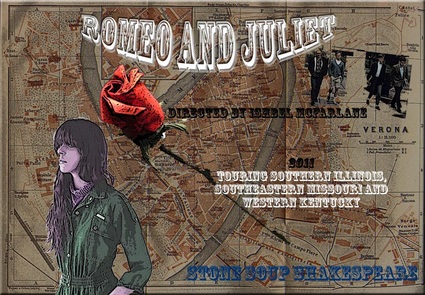Romeo and Juliet 2011 Tour
directed by Ishbel McFarlane
Tour DatesMay 9 Marion Carnegie Public Library (Marion, IL), 6:15 pm
May 10 McCracken County Public Library (Paducah, KY), 6:00 pm May 11 Washington County Courthouse (Nashville, IL), 6:30 pm May 13 Tower Grove Park-Sons of Rest Shelter (St. Louis, MO), 6:30 pm May 15 Turley Park (Carbondale, IL), 6:30 pm Carbondale workshops run in conjunction with The Stage Company, follow this link for registration: http://www.stagecompany.org/Workshops.html |
director's notesFirst and foremost, for me this is a story about youth against age more than it is about Montague against Capulet. Young love is the literary road well travelled, but I believe that R&J takes the most scenic and direct route of all. Like the hurtling speed of the relationship between Juliet and her Romeo, R&J must say in one word what others have the luxury to say in ten. This means that the characters of the Capulets, the Montagues, the Prince and most of all the two confidants – the Nurse and the Friar – are especially important, and possibly guilty. Certainly the Friar claims the most guilt for the violent scene at the end. He spends the whole play trying to get Romeo and then also his lover to slow down, to take time, to contemplate before acting, but he does not remember well enough how deaf are young ears to such warnings. In the words of another great British bard, 'Youth cannot know how age thinks and feels. But old men are guilty if they forget what it was to be young'. Prizes for those who recognise the bard and name the work.
This is a play of opposing pairs of games of love and chance in which everyone loses. Little boys and little girls playing dodgeball, not chess. So the words that I would bring to this play are mostly also in pairs: youth, maturity; speed, thought; lust, hatred; drama, melodrama; waking, dreaming; hoping, fearing; immortality and death. But, as in all good English essays, these are not divided by lines, we continually see one inside the other inside the first. We might try to keep them seperate, but like the lovers, these concepts kiss and make love with each other despite it all. Though they sometimes talk of a fear of death, Juliet, Mercutio, Tybalt and Romeo seem steeped to their hair-ends in their own youthful immortality. Mercutio talks of arousal, but is penetrated with a knife. Capulet and Montague have years on their side which allow them to rule their families, but their argument is infantile and, arguably, Capulet's behaviour towards his daughter in act 3 scene 4 is without match in the play for immaturity. |


